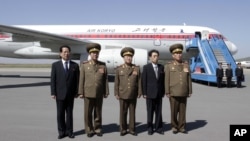North Korean state media have confirmed the country's hawkish army chief has been replaced, just months after he was appointed.
Since August, there have been rumors North Korea's young leader Kim Jong Un ousted his army's general chief of staff Kim Kyok Sik.
On Thursday, the Korean Central News Agency confirmed the move, mentioning Ri Yong Gil as the military chief that accompanied Kim on an official visit to a prominent mausoleum.
Little is known about Ri, except for that he was a three-star general who previously headed up the army's general staff operations department.
Kim Jong Un has replaced several top military and government officials since he took power following the death of his father, Kim Jong Il, in late 2011.
Analyst Ken Gause of the CNA Corporation, told VOA's Korean service the shuffling of military leaders is part of Kim's attempt to exert more control over the armed forces.
"He is maintaining a line of information on military matters from individuals who have a lot of operational experience, but they don't have a whole lot of political clout," he said. "So I think that is what we are seeing here. Its part of the consolidation process in terms of enforcing his will over the military."
The KCNA article was documenting Kim's visit to Pyongyang's Kumsusan Palace of the Sun, where the bodies of his father and grandfather are on display. Thursday is the 68th anniversary of the founding of the North Korean Worker's Party.
This report was produced in collaboration with the VOA Korean service.
Since August, there have been rumors North Korea's young leader Kim Jong Un ousted his army's general chief of staff Kim Kyok Sik.
On Thursday, the Korean Central News Agency confirmed the move, mentioning Ri Yong Gil as the military chief that accompanied Kim on an official visit to a prominent mausoleum.
Little is known about Ri, except for that he was a three-star general who previously headed up the army's general staff operations department.
Kim Jong Un has replaced several top military and government officials since he took power following the death of his father, Kim Jong Il, in late 2011.
Analyst Ken Gause of the CNA Corporation, told VOA's Korean service the shuffling of military leaders is part of Kim's attempt to exert more control over the armed forces.
"He is maintaining a line of information on military matters from individuals who have a lot of operational experience, but they don't have a whole lot of political clout," he said. "So I think that is what we are seeing here. Its part of the consolidation process in terms of enforcing his will over the military."
The KCNA article was documenting Kim's visit to Pyongyang's Kumsusan Palace of the Sun, where the bodies of his father and grandfather are on display. Thursday is the 68th anniversary of the founding of the North Korean Worker's Party.
This report was produced in collaboration with the VOA Korean service.





